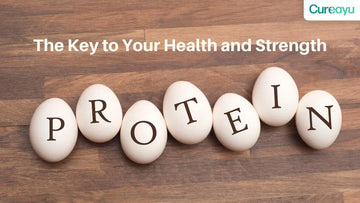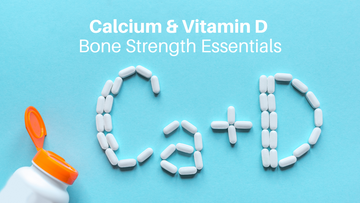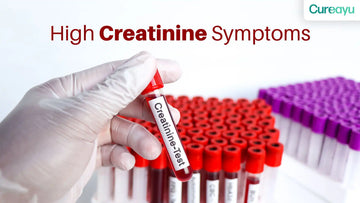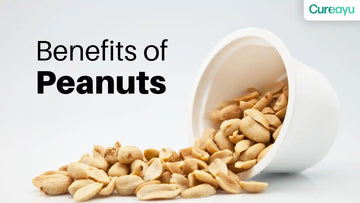Protein is a vital nutrient that plays a crucial role in maintaining overall health and well-being. Often referred to as the building block of life, protein is involved in almost every function of the body, from repairing tissues to producing enzymes and hormones. Despite its importance, many people overlook their protein intake, focusing more on carbohydrates and fats. However, an adequate amount of protein in your diet is essential for achieving optimal health, especially if you are active or aiming to improve your body composition.
Whether you're an athlete looking to build muscle, a person trying to lose weight, or simply someone who wants to maintain a healthy lifestyle, understanding the benefits of protein is key. This blog will delve into what protein is, why it is important, and the various benefits it offers to the body. Additionally, we’ll explore rich sources of protein and discuss the advantages of a protein-rich diet compared to relying on protein supplements.
Also Read: Exploring the Difference Between Ayurveda and Homeopathy: An Insightful Comparison
What Is Protein?
Protein is a macronutrient made up of amino acids, which are the building blocks that the body uses to create and repair tissues. There are 20 different amino acids, nine of which are considered essential because the body cannot produce them on its own. These essential amino acids must be obtained from the diet.
Proteins are involved in nearly every cellular process in the body. They make up the structure of cells, help in the transportation of molecules, facilitate chemical reactions as enzymes, and play a critical role in immune function. Proteins are also necessary for the production of hormones and other vital substances in the body.
Why Is Protein Important?
Protein is important because it supports a wide array of bodily functions. Without adequate protein, the body cannot perform these functions effectively, leading to various health issues. For instance, protein is crucial for muscle repair and growth, making it essential for athletes and those engaging in regular physical activity. It also helps in weight management by increasing satiety and reducing cravings.
Furthermore, protein is vital for maintaining strong bones, supporting immune function, and even contributing to the production of energy. A diet lacking in protein can lead to muscle loss, weakened immunity, and slower recovery from illness or injury. Therefore, ensuring sufficient protein intake is essential for maintaining overall health and vitality.
Also Read: Discover Top 15 Immune Boosting Foods for Healthier Living
What Does Protein Do For The Body?
- Tissue Growth and Repair: Protein plays a vital role in building and mending tissues throughout the body. It is essential for the maintenance of muscles, skin, organs, and other bodily structures, ensuring that they function properly and regenerate as needed.
- Enzyme and Hormone Production: Proteins are the foundation for the production of enzymes and hormones. These biological molecules drive many bodily functions, including metabolism, mood regulation, and overall physiological balance.
- Immune System Support: Proteins are key components of antibodies, which the immune system uses to identify and neutralize harmful pathogens. This makes protein essential for keeping the body defends against infections and illnesses.
- Energy Source: Although not the primary fuel, protein can be broken down into glucose to provide energy, particularly during times when carbohydrates are scarce or when the body needs an additional energy boost.
- Fluid Regulation: Proteins help manage the body’s fluid balance by drawing and retaining water within tissues, ensuring that cells stay hydrated and function optimally.
- Nutrient Transportation: Proteins act as carriers for various nutrients, including oxygen, vitamins, and minerals, facilitating their movement throughout the body and ensuring they reach the cells that need them.
- Digestive Support: Protein-based enzymes are crucial for the digestive process. They break down food into smaller molecules that the body can easily absorb and use for energy, growth, and repair.
- Keratin Production: Protein is a key component of keratin, a structural protein vital for the health and strength of skin, hair, and nails, contributing to their resilience and appearance.
- Bone Integrity: Protein contributes to the strength and density of bones. Adequate protein intake supports the skeletal system, reducing the risk of bone-related conditions like osteoporosis.
- Muscle Mass Maintenance: Protein is critical for maintaining muscle mass, particularly as you age. It helps in the preservation and growth of muscle tissue, preventing muscle degradation over time.
Protein Benefits For The Body
- Muscle Growth and Recovery: Protein is indispensable for muscle development and repair. It ensures that after exercise or injury, muscles recover quickly and grow stronger, supporting athletic performance and daily physical activities.
- Effective Weight Management: Protein is known for its ability to keep you full longer, thereby curbing overeating and aiding in weight loss or maintenance. Its thermic effect also boosts metabolism, helping burn more calories even at rest.
- Enhanced Metabolic Rate: Protein-rich foods increase the body’s metabolic rate due to the energy required to digest them. This higher metabolic rate aids in burning more calories throughout the day, supporting weight management efforts.
- Robust Immune Defense: Proteins are vital for producing antibodies that protect the body from infections and diseases. A protein-rich diet strengthens the immune system, making it more resilient to illnesses.
- Radiant Skin, Hair, and Nails: Adequate protein intake supports the production of keratin, leading to healthier, stronger hair, glowing skin, and resilient nails. This promotes an overall youthful and vibrant appearance.
- Bone Strength and Health: Protein is essential for maintaining strong bones, helping to prevent fractures and reduce the risk of osteoporosis. It ensures that the skeletal system remains robust and functional as you age.
- Quick Recovery: After physical exertion or injury, protein aids in the rapid repair of tissues, reducing inflammation, and promoting faster recovery times. This is especially crucial for athletes and those with active lifestyles.
- Balanced Hormones: Protein supports the production of critical hormones like insulin and growth hormone. By maintaining adequate protein levels, the body can better regulate these hormones, ensuring proper metabolic function and overall hormonal balance.
- Sustained Energy Levels: While carbs are the body’s preferred energy source, protein can be metabolized into glucose for energy, particularly during prolonged physical activities or when carb intake is low.
- Optimal Fluid Balance: Proteins help regulate the distribution of fluids in the body, preventing issues like edema (fluid retention) and maintaining the proper hydration of tissues, which is crucial for overall cellular function.
Also Read: How to Boost Immune System: Strengthen Your Body's Defense
Rich Sources Of Protein
- Lean Meats: Chicken, turkey, and lean cuts of beef or pork are excellent sources of high-quality protein. They provide all essential amino acids and are versatile in cooking.
- Fish and Seafood: Fish like salmon, tuna, and mackerel are not only rich in protein but also provide omega-3 fatty acids, which are beneficial for heart health.
- Eggs: Eggs are a complete protein source, meaning they contain all nine essential amino acids. They are also rich in vitamins and minerals.
- Dairy Products: Milk, cheese, and yogurt are not only rich in protein but also provide calcium, which is important for bone health.
- Legumes: Beans, lentils, and chickpeas are great plant-based protein sources. They are also high in fiber, which supports digestive health.
- Nuts and Seeds: Almonds, walnuts, chia seeds, and flaxseeds are rich in protein, healthy fats, and fiber, making them a nutritious snack option.
- Soy Products: Tofu, tempeh, and edamame are excellent sources of plant-based protein, particularly for vegetarians and vegans.
- Whole Grains: Quinoa, farro, and brown rice provide a good amount of protein along with fiber and essential nutrients.
- Protein-Rich Vegetables: Vegetables like broccoli, spinach, and Brussels sprouts contain smaller amounts of protein, which can add up when combined with other protein sources.
- Protein Supplements: While whole foods are the best source of protein, protein supplements like whey, casein, and plant-based protein powders can help meet your protein needs, especially for athletes or those with higher protein requirements.
Benefits Of Protein Rich Diet Over Protein Supplements
- Nutrient Density: A protein-rich diet provides not only protein but also other essential nutrients like vitamins, minerals, and fiber, which are often lacking in protein supplements.
- Better Satiety: Whole foods rich in protein take longer to digest, helping you feel fuller for longer periods. This can aid in weight management by reducing the need for frequent snacking.
- Balanced Nutrition: Consuming protein from a variety of food sources ensures that you get a wide range of nutrients that work together to support overall health, something that protein supplements alone cannot provide.
- Improved Digestion: Whole foods that are high in protein also contain dietary fiber, which supports healthy digestion and prevents issues like constipation, a benefit not offered by protein supplements.
- Natural Sourcing: Whole foods are less processed compared to supplements, which often contain additives, preservatives, and artificial ingredients. Choosing whole foods ensures you're consuming protein in its most natural form.
Conclusion
Protein is an essential nutrient that supports nearly every function in the body. From building and repairing tissues to producing enzymes and hormones, protein plays a vital role in maintaining health and well-being. Incorporating a variety of protein-rich foods into your diet ensures that you receive not only the benefits of protein but also a wide range of other nutrients that contribute to overall health. While protein supplements can be helpful in certain situations, a protein-rich diet is generally more beneficial, providing balanced nutrition, better satiety, and improved digestion. Prioritizing protein in your daily diet is a key step toward achieving and maintaining optimal health, no matter your age or lifestyle.











